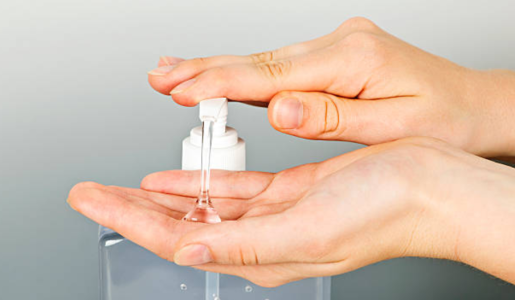Businesses urgently remove this common product, and you should be concerned
By
Gian T
- Replies 0
Businesses are urged to remove hand sanitiser from public areas in a concerning development with health authorities and law enforcement on high alert.
This drastic measure comes in response to reports of individuals consuming the germ-killing gel for its alcohol content, a dangerous practice that poses serious health risks.
The issue first came to light when Northern Territory Chief Health Officer Christine Connors sent a letter to retailers.
'Unfortunately, a small number of individuals can misuse hand sanitiser,' Ms Connors stated, urging businesses to either remove it or ensure it is properly secured.
This alarming trend is not just a quirky news item; it's a public health emergency.
Hand sanitisers typically contain a high percentage of alcohol, often higher than that found in many spirits, making them potentially lethal if ingested in more than small quantities.
The consumption of hand sanitiser can lead to alcohol poisoning, with symptoms ranging from confusion and vomiting to seizures and even death.
NT Police Commissioner Michael Murphy has also expressed his concerns, revealing that some residents are mixing hand sanitiser with non-alcoholic beer to create a potent and dangerous cocktail.
'I'm hearing they're drinking hand sanitiser,' Commissioner Murphy said.
'They're actually buying hand sanitiser and zero beer and mixing it together.'
The situation is particularly dire in Alice Springs, where an alcohol ban has led some to seek out alternative sources of intoxication.
According to Michael Liddle from the Central Australian Aboriginal Congress, hand sanitiser is chosen over alcohol for its quick and powerful effects.
'It's quick, it's effective, it's cheap, and it's easy to have access to it,' Liddle explained.
Blair McFarland, named NT Australian of the Year last year, highlighted the extreme dangers associated with this practice.
'Hand sanitiser has twice the alcohol content of vodka,' McFarland warned.
'It's super dangerous and really bad for your kidneys. It just catapults you more quickly into a state where you're incoherent and unreasonable.'
The gravity of the situation has led to calls for NT Health to classify hand sanitiser as a proscribed substance, making it more difficult to access and hopefully curbing misuse.
Last year, Commissioner Murphy suggested that hand sanitiser be stored under lock and key, similar to other substances that can be abused, such as deodorant and glue.
As members of the Seniors Discount Club, it's important to be aware of these developments for several reasons.
Firstly, the safety of our community is paramount, and understanding the risks associated with such products can help prevent accidental misuse among friends and family.
Secondly, this trend underscores the need for continued vigilance and support for those struggling with substance abuse, particularly in remote and vulnerable communities.
We encourage our readers to discuss these issues with their loved ones and support local initiatives to address substance abuse and promote public health.
Credit: YouTube

Should hand sanitiser be restricted, or are there better ways to prevent misuse? How can communities stop misuse while keeping essential products available? Let us know in the comments below.
This drastic measure comes in response to reports of individuals consuming the germ-killing gel for its alcohol content, a dangerous practice that poses serious health risks.
The issue first came to light when Northern Territory Chief Health Officer Christine Connors sent a letter to retailers.
'Unfortunately, a small number of individuals can misuse hand sanitiser,' Ms Connors stated, urging businesses to either remove it or ensure it is properly secured.
This alarming trend is not just a quirky news item; it's a public health emergency.
Hand sanitisers typically contain a high percentage of alcohol, often higher than that found in many spirits, making them potentially lethal if ingested in more than small quantities.
The consumption of hand sanitiser can lead to alcohol poisoning, with symptoms ranging from confusion and vomiting to seizures and even death.
NT Police Commissioner Michael Murphy has also expressed his concerns, revealing that some residents are mixing hand sanitiser with non-alcoholic beer to create a potent and dangerous cocktail.
'I'm hearing they're drinking hand sanitiser,' Commissioner Murphy said.
'They're actually buying hand sanitiser and zero beer and mixing it together.'
The situation is particularly dire in Alice Springs, where an alcohol ban has led some to seek out alternative sources of intoxication.
According to Michael Liddle from the Central Australian Aboriginal Congress, hand sanitiser is chosen over alcohol for its quick and powerful effects.
'It's quick, it's effective, it's cheap, and it's easy to have access to it,' Liddle explained.
Blair McFarland, named NT Australian of the Year last year, highlighted the extreme dangers associated with this practice.
'Hand sanitiser has twice the alcohol content of vodka,' McFarland warned.
'It's super dangerous and really bad for your kidneys. It just catapults you more quickly into a state where you're incoherent and unreasonable.'
The gravity of the situation has led to calls for NT Health to classify hand sanitiser as a proscribed substance, making it more difficult to access and hopefully curbing misuse.
Last year, Commissioner Murphy suggested that hand sanitiser be stored under lock and key, similar to other substances that can be abused, such as deodorant and glue.
As members of the Seniors Discount Club, it's important to be aware of these developments for several reasons.
Firstly, the safety of our community is paramount, and understanding the risks associated with such products can help prevent accidental misuse among friends and family.
Secondly, this trend underscores the need for continued vigilance and support for those struggling with substance abuse, particularly in remote and vulnerable communities.
We encourage our readers to discuss these issues with their loved ones and support local initiatives to address substance abuse and promote public health.
Credit: YouTube
Key Takeaways
- Health authorities in the Northern Territory have requested businesses to remove hand sanitiser from public areas due to the misuse of the product by locals consuming it for its alcohol content.
- NT chief health officer Christine Connors has advised against providing hand sanitiser in businesses, suggesting that if they do, it should be properly secured.
- NT Police Commissioner Michael Murphy has expressed concern about residents mixing hand sanitiser with non-alcoholic beer to create a potent and harmful drink.
- There are considerations for placing hand sanitiser on the territory's list of prescribed substances to regulate its accessibility following reports of abuse.








